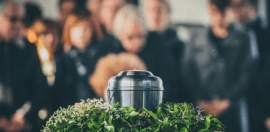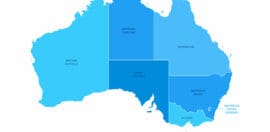Seniors conquer the digital divide with a little help from friends

28 June 2022 at 8:51 am
Elderly people are often left behind in the digital world, but a community housing organisation has found a way to help bridge the gap.
When Malcolm Locke’s wife died, he found himself not just without a companion, but without access to some of life’s essentials.
The 75-year-old said his wife had taken care of the couple’s banking and other needs via the computer – but Locke had never used one before.
“I’ve never worried about using an iPad and all that, so I had to learn how to do it, to go do the banking and everything else. But I didn’t have a clue what I was doing. I didn’t even know how to turn the damn thing on,” he told Pro Bono News.
Locke is a tenant of Community Housing Queensland (CHQL), and it wasn’t long before his struggles came to the attention of Connie Crookshanks, CHQL’s community development manager.
Crookshanks had applied for a Be Connected grant from the federal government, with the aim of buying some digital devices and running digital learning classes for seniors if she was successful.
She had noticed that many of her tenants were impacted by the digital divide, a term for the gap between those who have access to digital technologies and those who don’t.
While she says she knew it was unusual for a community housing provider to get involved in addressing something like that, she felt driven to help CHQL’s tenants stay in touch with the world.
“Because of that [digital divide], people miss out on a lot of information, a lot of opportunities. I think we’d all agree to some extent [that seniors] have been left behind in the digital world,” she said.
She received three grants and immediately set about putting the classes together to help tenants like Locke learn to navigate the online world.
Digital skills transform learners
Crookshanks got in touch with IT 4 Retirees to help deliver group and online classes for CHQL’s elderly tenants.
The group classes covered digital basics like staying safe online, and using apps for things like Medicare. They were capped at eight participants each to allow people to have the time and space to learn at their own pace.
Most learners are at different stages in their digital journey; some have been taught some tips and tricks by their children or grandchildren, while others, like Locke, were scared to touch the iPad for fear of pressing the wrong button.
See more: Government urged to address the digital divide
Crookshanks used one of the grants to purchase iPads for the learners to borrow on a rotating basis. Once returned, the iPads are wiped clean and passed on to the next borrower.
One of the biggest challenges Crookshanks faced was bringing together tenants from up and down the Gold Coast.
She hired a room at the Robina Community Centre, and a teacher visits once a week to deliver the class.
The transformation has been remarkable, with tenants able to connect with family and friends online, and some even ordering their groceries online too.
“It’s also turned into quite a social activity. Tenants are meeting other tenants for the first time and you know, they’re having a bit of fun. It’s all worked out really, really well,” Crookshanks said.
Reconnecting with the world
Locke said he has enjoyed the social aspect of the classes.
“We all get along quite well, actually. We laugh and giggle,” he said.
He has also found the teachers to be extremely helpful in breaking down the steps of using the devices. And, if he ever has trouble, he can always ask one of his more advanced classmates for help.
Locke added that since joining the classes, he has bought himself an Apple iPhone 11 and is “learning how to use it quite well”.
The classes are guided by resources on the Be Connected website, and take students through everything from sending emails and setting up a MyGov account to taking photos.
For Locke, email was one of the most important things to learn.
“When you’ve never used any of this before, it’s really double Dutch to you when you first look at it. But then the further you go into it, the more you learn,” he explained.
“The things that I’ve learned out of this, it’s been amazing to me.”
He added that conquering the digital divide has opened up a new world for him.
“To me the main thing is banking. Before I learned this, I had to go down to the bank all the time to find out how much was in my accounts. Now I just go online every few days and I know where all the money is going.”
Crookshanks added that with so much of the world’s interactions being electronic, it was important to ensure that everyone was able to do so safely and with a degree of knowledge about what they are doing.
“There is a whole generation of people that are in many ways being left behind because they might have finished their working lives before all of this technology came onto the scene. We’re helping a lot of our tenants basically to play catch up and supporting them to do that,” she said.
Online, and ready for what’s next
While Crookshanks said the funding will soon come to an end, she’s hopeful that some of those involved in the classes will be able to use funding from their own care plans to keep their learning going.
She expects the skills the students have picked up will stand them in good stead to stay connected to family and friends, especially if another lockdown happens.
Locke said he feels that if he had started on digital devices earlier in his life, he might not have been so worried about them. Now able to work his way around an iPad or iPhone with confidence, he told Pro Bono News that other seniors like him should just “give it a go”.
“It doesn’t worry me anymore, opening up the iPad or getting on the phone. Actually, I love getting on my phone and going through all the apps. I love phoning all my friends,” he said.
“[This] is probably one of the best things that’s ever happened to me in my life, to be quite honest.”
Crookshanks echoed his words and said not-for-profit organisations looking for a way to help their clients overcome the digital divide should just do it.
They could start by using Be Connected resources to whet their members’ appetites, before looking for local classes such as those on offer in many public libraries, she suggested.
“If you want to do something, you will find someone who will gladly help you. There’s lots of fabulous volunteers out there that were just champing at the bit to be able to help out,” she said.
“It’s a little bit out of the norm for a community housing organisation like ourselves to be in receipt of monies like this [but] I’m really glad that we applied for it. It’s certainly something that our tenants have benefited from.”







